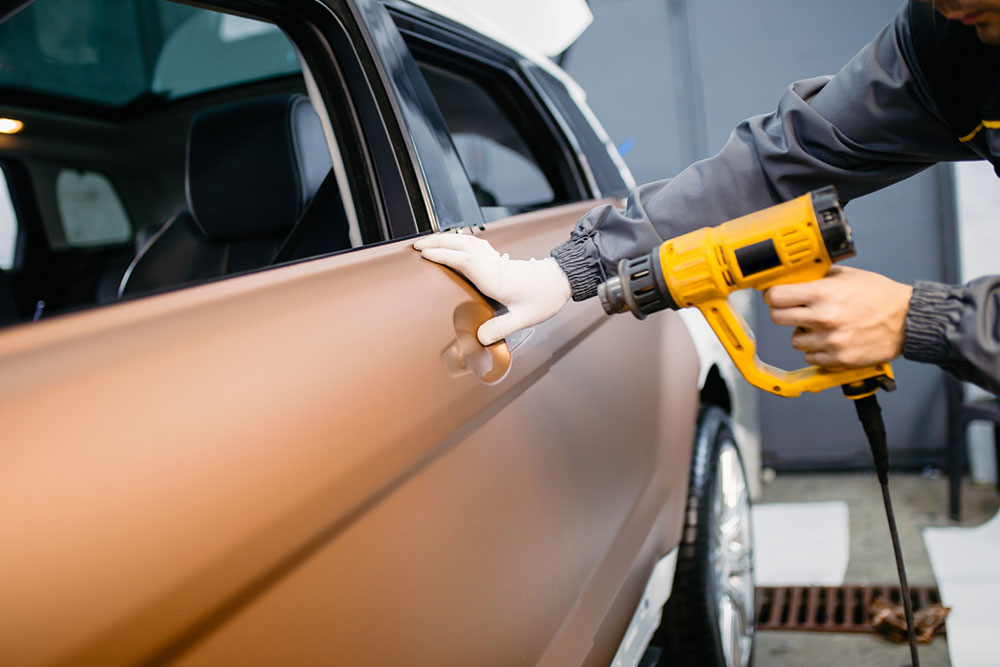Car Wraps – 5 Types and How Much They Cost
Car wrapping involves applying a special thin film to the car. Think of it as the process of giving the car a brand-new outfit—except in most cases, this outfit is made of vinyl. The purpose of getting car wrapping is to protect the original finish, add some designs, or print some touring or advertising material.

Types of car wraps
Here are a few popular types of car wraps:
1. Full wraps
As the name suggests, full wraps cover the entire vehicle. They allow car owners to change the appearance of their cars. Most people use a wrap with a solid color as a full wrap. It can cost a lot less than a complete paint job. In addition, wraps are reversible and can be undone whenever one wants. Full wraps are also often known as color-change wraps.
In some cases, car owners might use a full-coverage wrap with the same color as the vehicle’s original color. It can be a smart way to keep the car’s original finish safe from scratches and bumps. This is why some refer to it as a protective wrap. Full wraps can be a bit more expensive than other kinds of wraps. They are still the easiest and most cost-effective way of changing up the car’s entire exterior. If a person does not like how the wrap changes the car’s appearance, they can simply have the wrap peeled off and return to the old look of the vehicle.
2. Partial wraps
Based on what the name suggests, partial names only cover specific parts of the vehicle. This is a great choice for people who want something that is far less attention-catching than a full wrap. It can be used by people who do not want to commit to having a full wrap. If someone does not want to completely change how their car looks or wants to have a subtle effect on the car, a partial wrap can be a great choice. If some vehicles will be used for promotional drives or purposes, a partial wrap might deliver the desired effect. It can be a better choice if the car has a remarkable appearance. People must remember that any car that grabs someone’s attention will deliver the desired results. Commonly, partial wraps are pasted to the car’s trunk, hood, roof, and doors. All the wrapped surfaces of the car can be decorated with advertisements or branding that can garner the viewer’s attention.
3. Glossy wraps
Glossy wraps are among the most popular types used for car wrapping. It is a durable, long-lasting choice that can serve as a highly reflective surface for added safety. The wraps have a glossy appearance. They make it easy to spot cars with glossy wrapping, even at the top of a mountain or the bottom of a lake. The appealing appearance is only one reason glossy car wraps have gained more and more popularity recently. Some glossy wraps might call for an added layer of paint when they spend extra time outdoors.
4. Carbon fiber wraps
Real pieces of carbon fiber are used to make carbon fiber wraps. These types of car wrappings are often found in luxury automobiles. They are also commonly chosen by people who prefer having their vehicles customized. In most cases, vehicle wraps are made from vinyl, leaving one with few other options if they do not want vinyl wraps. Carbon fiber wraps give the vehicle a matte finish.
This matte finish usually has a grayish-black appearance and some texture. Some even prefer carbon-fiber wraps because of their resistance to damage. Its strength makes carbon fiber wraps the ideal choice to keep the car protected. They are, hence, often used as a protective wrap for vehicles. However, remember that carbon fiber wraps can be harder than vinyl wraps to apply. It is especially difficult when used as a full wrap. It is better to seek help from professionals when dealing with carbon fiber wrap. On close inspection, one should remember that these might not be as undetectable as vinyl wraps.
5. Chrome wraps
A chrome wrap is preferable and affordable for people who want their cars plated with solid chrome. And if anyone has tried finding out the cost of that project, know that it is high. Consider the chrome wrap as an alternate option. A popular reason for people to choose this wrap is the flashy appearance it will lend to their cars. However, like with carbon fiber wrap, chrome wrap can be difficult. One might need professionals to help with the task, as it is a heavy one. Most people recommend having a professional complete the car wrapping when opting for chrome wraps. An added benefit is that chrome wraps ensure the cars do not absorb excess heat. This is because these car wraps are great at reflecting the light on the vehicle, thereby reducing the absorption rate. People with chrome wraps on their cars can rest assured that come summertime, their cars won’t be burning up with seats too hot to sit on. Avoiding that experience is reason enough to get chrome wraps.
The cost of car wrapping can change based on the amount of film required, the type of wrapping, the color, and the professional. Every dealership or individual might have a different price to quote. Try to bargain the price of the car wrap after finding the price range from a few professionals. The car’s make, model, and size also result in different costs for wrapping. The average cost of full car wrapping can be estimated at $2,500 to $6,000. The minimum average price for the job is $2,000. Installation charges alone can cost a person up to $6 per square foot. This means luxury cars would cost approximately thrice the cost of coupes, family sedans, or small SUVs to be wrapped.











